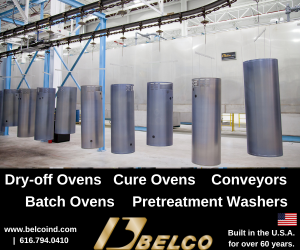Stripping Anodic Coating
Question: What is the best way to strip an anodize coating?
Question:
What is the best way to strip an anodize coating? Is it possible to use a zincate, as I have heard some people do? L.H.
Answer:
There are many ways to strip the anodic coating from the aluminum substrate. Two or three come to mind in particular and it depends on the situation as to which method is “best”.
The most common method of stripping used in production anodizing lines uses a bath of caustic soda (sodium hydroxide) and water. The concentration of caustic is generally 2-10% of 50% liquid caustic soda by volume in water. (Note: liquid caustic soda is sold in its concentrated form as 50% liquid caustic. In other words, the most concentrated solution you can readily purchase is a mixture of 50% water and 50% sodium oxide.) A temperature of 120-150F using plenty of air agitation is the usual procedure. The anodic coating will strip in a few seconds to a few minutes depending on the bath concentration and temperature, the anodize coating thickness and the degree of seal of the coating. For some well sealed, heavier coatings an acid soak, such as in the desmutting bath, of up to 30 minutes in duration prior to stripping will usually ensure that the coating comes off uniformly. There is more to the caustic bath chemistry than meets the eye. I will only mention in passing that the bath should include additives that contain various sequestering and chelating agents to help keep the dissolved aluminum in suspension. This is crucial because if the aluminum were to build up to the point where, without these additives, the bath could no longer hold it in suspension, a rock-hard hydrate of aluminum would form in the tank and render it inoperable. Any more detail than this about the bath operation involves a lengthy explanation and is beyond the scope of your question.
Another method of stripping the anodic coating uses various combinations of sulfuric acid and chromic acid at about 130-140F. This chemistry will readily remove the anodic coating but will not remove aluminum in the process, as caustic soda does. This was a popular stripper and desmutter in anodizing lines until about 1970 when environmental concerns about chromates began to take hold. The common chemistry for this bath is 175-g/liter chromic acid plus 35-g/liter sulfuric acid in water.
Another stripping solution that removes only the oxide coating can be found as part of ASTM B 680-80(1989), the Acid Dissolution Test. This method uses 20 g of chromic acid anhydride and 35 ml of orthophosphoric acid (85% mass) in distilled or deionized water to make one liter of solution. This procedure is only used in the laboratory to measure both coating weight and to assess the quality of seal.
I do not have any experience using a zincate bath as a stripper for the anodize coating and I was unable to locate anyone who has. Zincate is used as a pretreatment for electroless nickel plating on aluminum. I would not recommend it for stripping the anodize coating from aluminum.
Related Content
Products Finishing Reveals 2024 Qualifying Top Shops
PF reveals the qualifying shops in its annual Top Shops Benchmarking Survey — a program designed to offer shops insights into their overall performance in the industry.
Read MoreTop Shop Aces Outstanding Customer Service
More than a finishing shop, this anodizing, powder coating and vacuum resin impregnating business goes above and beyond for its customers by being a resource for whatever their finishing needs might demand.
Read MoreA Smooth Transition from One Anodizing Process to Another
Knowing when to switch from chromic acid anodizing to thin film sulfuric acid anodizing is important. Learn about why the change should be considered and the challenges in doing so.
Read MoreUnderstanding PEO Coatings
Using high-speed cameras and back side illumination (BSI) sensor technology to analyze plasma electrolytic oxidation.
Read MoreRead Next
Episode 45: An Interview with Chandler Mancuso, MacDermid Envio Solutions
Chandler Mancuso, technical director with MacDermid Envio discusses updating your wastewater treatment system and implementing materials recycling solutions to increase efficiencies, control costs and reduce environmental impact.
Read MoreDelivering Increased Benefits to Greenhouse Films
Baystar's Borstar technology is helping customers deliver better, more reliable production methods to greenhouse agriculture.
Read MoreA ‘Clean’ Agenda Offers Unique Presentations in Chicago
The 2024 Parts Cleaning Conference, co-located with the International Manufacturing Technology Show, includes presentations by several speakers who are new to the conference and topics that have not been covered in past editions of this event.
Read More










.jpg;maxWidth=300;quality=90)











